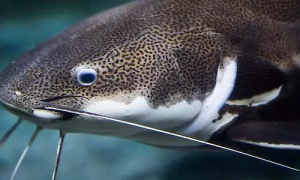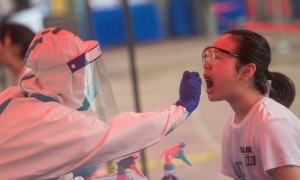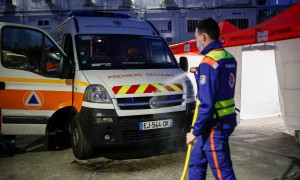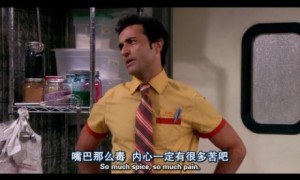细菌让牛仔裤的染料更加“绿色”。
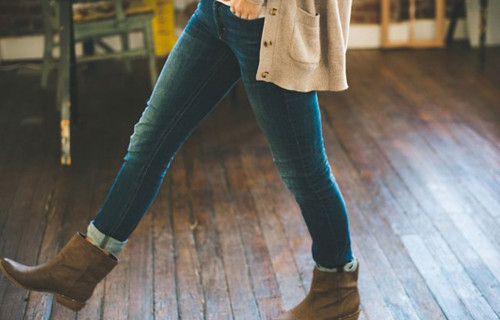
They can be tight, flared, ripped at the knee. Jeans come in all styles and colours these days, but one hue will always be synonymous with the world’s favourite garment: indigo blue.
如今,牛仔裤有各种款式和颜色,款式有紧身的、喇叭式的、露膝盖的。但是有一种颜色一直是世界上最受欢迎的服装的代名词:靛蓝色。
To satisfy the world’s seemingly insatiable demand for blue denim, more than 45,000 tonnes of indigo dye are produced every year, with much of the waste making its way into rivers and streams, conservationists say.
环保主义者称,为满足世界对蓝色牛仔布无尽的需求,每年要生产45000多吨靛蓝染料,同时造成大量的废物流入河流和小溪。
On Monday, scientists announced they had developed a greener method to produce the coveted tint -- using lab-grown bacteria.
周一, 科学家们宣布他们已经开发出一种更加绿色环保的方法,生产人们一直渴望的色调——利用实验室培育的细菌。
While not yet commercially viable, the technique holds promise for a "much-needed update to the historic, but unsustainable, indigo dyeing process," researchers wrote in the journal Nature Chemical Biology.
研究人员在《自然化学生物学》杂志上撰文称,这项技术虽然还没有商业可行性, 但是有望改良“历史上亟需更新的但不能长期保持色泽的靛蓝染色工艺。”
"Demand for the dye is higher than ever before, making its ecological consequences unsustainable," they warned.
他们警告说:“人们对染料的需求比以往任何时候都要大,这样会造成生态的不可持续。”
Originally extracted from plants, indigo is one of the oldest dyes, with evidence of its use in textile colouring going back some 6,000 years.
靛蓝染料最初是从植物中提取的, 是最古老的染料之一。有证据表明靛蓝染料用于纺织品着色的历史可以追溯到大约6000年前。
It is prized for being vibrant and long-lasting, and was an important cash crop until humans started making synthetic indigo in the early 1900s.
靛蓝染料的价值在于它的鲜艳色泽和持久性,它是一种重要的经济作物,到了20世纪早期人类开始生产人造靛蓝染料。
Indigo crystals cling easily to the cotton fibres used in jeans and are resistant to laundry detergents, yet flake off slightly with wear-and-tear to yield the sought-after worn-in look.
靛蓝水晶容易附着在用于制作牛仔裤的棉纤维上,而且经得住洗衣液的洗涤,但却会随着磨损而脱落,从而产生人们追求的磨损效果。
Some four billion denim garments are produced every year, the vast majority indigo-tinted, said the study authors, and warned of "a serious sustainability problem".
研究报告的作者们说,每年生产的牛仔服装大约有40亿件,绝大多数都是靛蓝色的。他们还警告说“这是一个严重的持续性问题”。
The first danger: producing indigo dye requires the use of toxic chemicals such as formaldehyde and hydrogen cyanide.
第一个危险: 生产靛蓝染料需要使用甲醛和氰化氢等有毒的化学物质。
Furthermore, synthesised indigo is insoluble in water, meaning chemicals are needed to make it suitable for dyeing.
另外,合成靛蓝不溶于水,这就意味着需要化学物质使其适合染色。
Not currently feasible
目前不可行
One such chemical is sodium dithionite, which decomposes into sulfate and sulfite which can corrode equipment and pipes in dye mills and wastewater treatment plants.
这样的一种化学物质是连二亚硫酸钠, 可以分解成硫酸盐和亚硫酸盐,会腐蚀染料厂和污水处理厂的设备和管道。
"Many dye mills avoid the additional cost of wastewater treatment by dumping the spent dye materials into rivers, where they have negative ecological impacts," said the research team.
研究小组说:“许多染料厂通过将废染料倾倒到河水里避免污水处理的额外费用,从而对河水产生不良的生态影响。”
The new method mimics the workings of the Japanese plant Persicaria tinctoria.
这种新的方法就是模仿日本蓼蓝植物的工作原理。
Instead of a plant, "we engineered a common lab strain of Escherichia coli, a bacteria found in our gut, to be a chemical factory for the production of indigo dye," study co-author John Dueber of the University of California’s bioengineering department told AFP.
新方法并不是一种植物。加利福尼亚大学生物工程系的合著者约翰·杜伯告诉法新社说:“我们设计了一种常见的大肠杆菌实验室菌株,这是一种在我们肠道里发现的细菌, 可以成为一个化学工厂,用于生产靛蓝染料。”
Like the plant, the bacteria produces a compound called indoxyl, which is insoluble and cannot be used as a dye. By adding a sugar molecule, the indoxyl is turned into indican -- a precursor of indigo.
像植物一样, 细菌产生的化合物称为吲哚酚,它不溶于水,不能用作染料。加入糖分子, 吲哚酚就会转化成糖苷——靛蓝前驱体。
Indican can be stored and transformed into indigo direcly on the cloth when dyeing, by adding an enzyme to the mix.
糖苷可以存储,染色时,可以在混合物中加入一种酶,这样糖苷就可以直接在布料上转化成靛蓝色。
The lab is working to make the process commercially feasible, Dueber said.
杜伯称,实验室正在努力使这一过程实现商业化。
For now, producing five grammes of indigo to colour one pair of jeans would require "several litres of bacteria," he said, and would be more expensive.
现在, 生产五克靛蓝色染料来染一条牛仔裤,就需要“数升的细菌”,他说, 牛仔裤以后会更贵。



